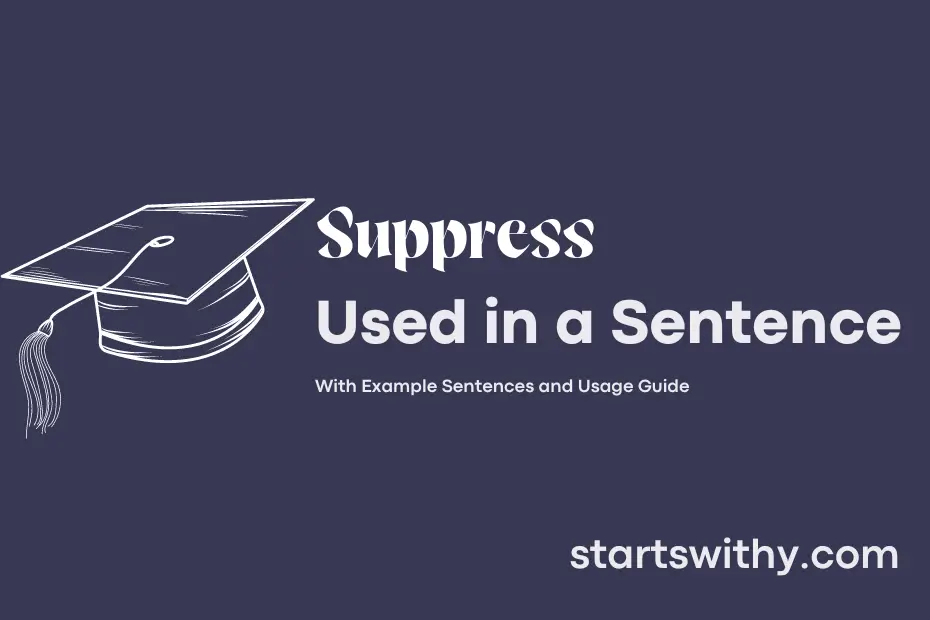“Suppress” means to forcibly put an end to something or prevent it from happening. This can involve restraining, controlling, or inhibiting certain actions, emotions, or expressions.
In various situations, individuals may find themselves needing to suppress their true feelings or thoughts in order to navigate social interactions, maintain composure, or adhere to societal norms. Learning how to effectively suppress emotions or impulses can be a valuable skill in managing interpersonal relationships and professional settings.
7 Examples Of Suppress Used In a Sentence For Kids
- Suppress the urge to talk while the teacher is speaking.
- Try to suppress your giggles during quiet time.
- It is important to suppress your anger and speak calmly.
- We should always try to suppress our feelings of jealousy towards others.
- Let’s all work together to suppress any feelings of negativity in the classroom.
- Remember to suppress any feelings of fear and face challenges bravely.
- Suppress any rude comments and speak kindly to your classmates.
14 Sentences with Suppress Examples
- Suppress your urge to check social media constantly while studying.
- Make sure to suppress distractions during group study sessions.
- It’s important to suppress any feelings of doubt during exams.
- Suppress the temptation to procrastinate on assignments.
- Don’t forget to suppress any negative thoughts that may hinder your performance.
- Remember to suppress any urge to plagiarize in your assignments.
- Always suppress the desire to skip classes for a day off.
- Make an effort to suppress any anxiety you may feel before a presentation.
- It’s crucial to suppress any distractions when working on important projects.
- Avoid the temptation to suppress your classmates during debates or discussions.
- Don’t hesitate to suppress any feelings of jealousy towards your peers’ accomplishments.
- Suppress the tendency to compare yourself to others in terms of academic achievements.
- Ensure to suppress any feelings of burnout by taking breaks and practicing self-care.
- Take steps to suppress any negative self-talk that may impact your confidence.
How To Use Suppress in Sentences?
To use Suppress in a sentence, you can follow these simple steps. First, identify the situation where you need to suppress something, such as emotions, urges, or information. For example, “She tried to suppress her laughter during the serious meeting.”
Next, find the subject of the sentence, which is the person or thing performing the action of suppressing. In the example sentence, the subject is “She.”
Then, locate the object of the sentence, which is the thing being suppressed. In this case, the object is “her laughter.”
After identifying the subject and object, connect them using the main word Suppress in the appropriate form based on the tense of the sentence. Make sure to place Suppress in the correct position within the sentence. For instance, “He always tries to suppress his anger when things don’t go his way.”
Remember to pay attention to the context of the sentence to ensure that the use of suppress fits the meaning you intend. Practice constructing sentences with suppress in different contexts to become more comfortable using it in your own writing.
Conclusion
In conclusion, the use of suppress in sentences typically refers to the act of restraining, inhibiting, or controlling something. For instance, “She tried to suppress her laughter during the serious meeting” illustrates the attempt to hold back an emotional reaction. Similarly, “The government tried to suppress information about the scandal” shows an effort to prevent the public from accessing certain details. Through these examples, we can see that suppress often implies a deliberate action to conceal or limit something.
Overall, the diverse ways in which suppress is used in sentences highlight its ability to convey various concepts of control and restraint. Whether it involves stifling emotions or concealing information, the term plays a crucial role in elucidating efforts to manage or contain certain elements within a given context.



